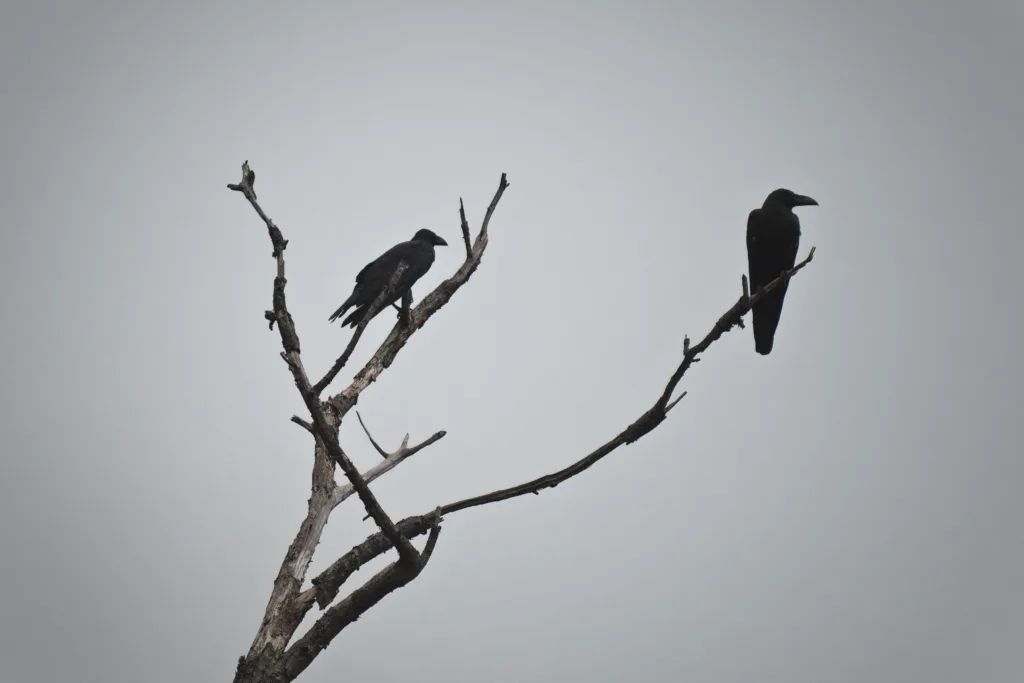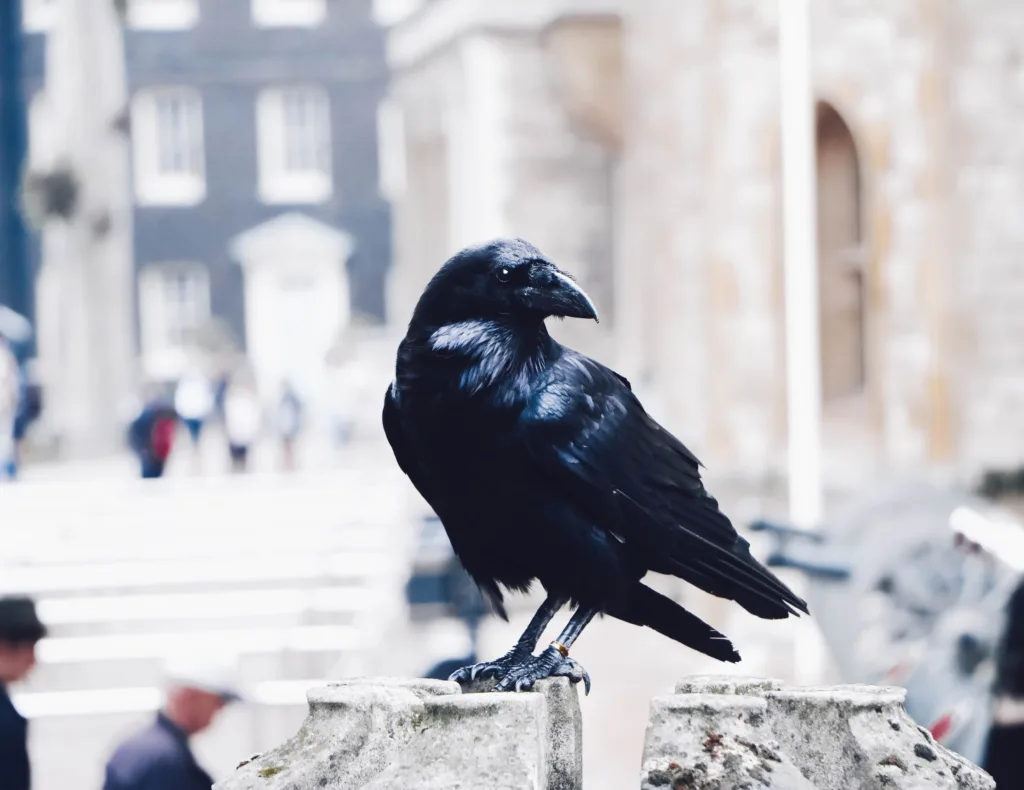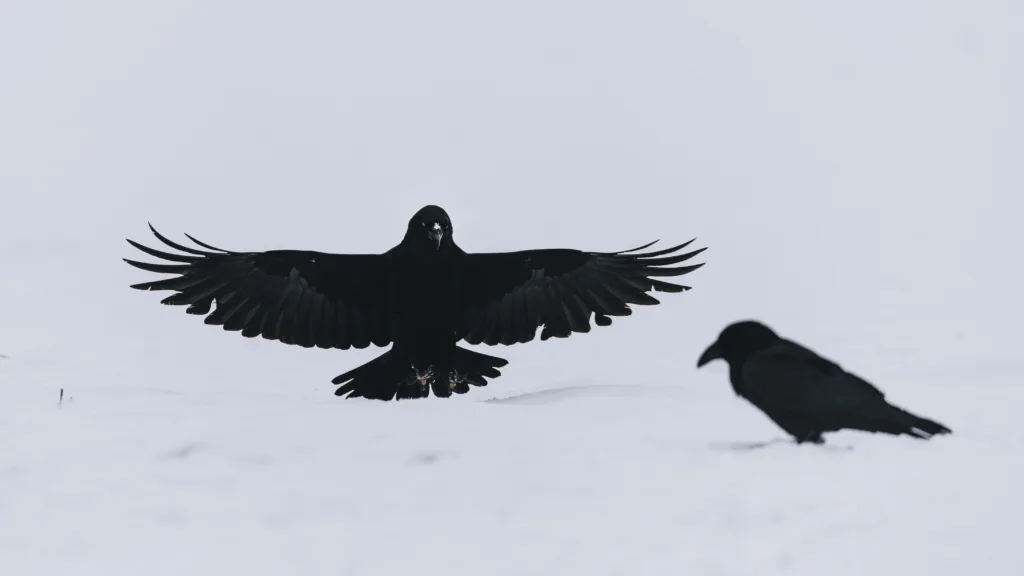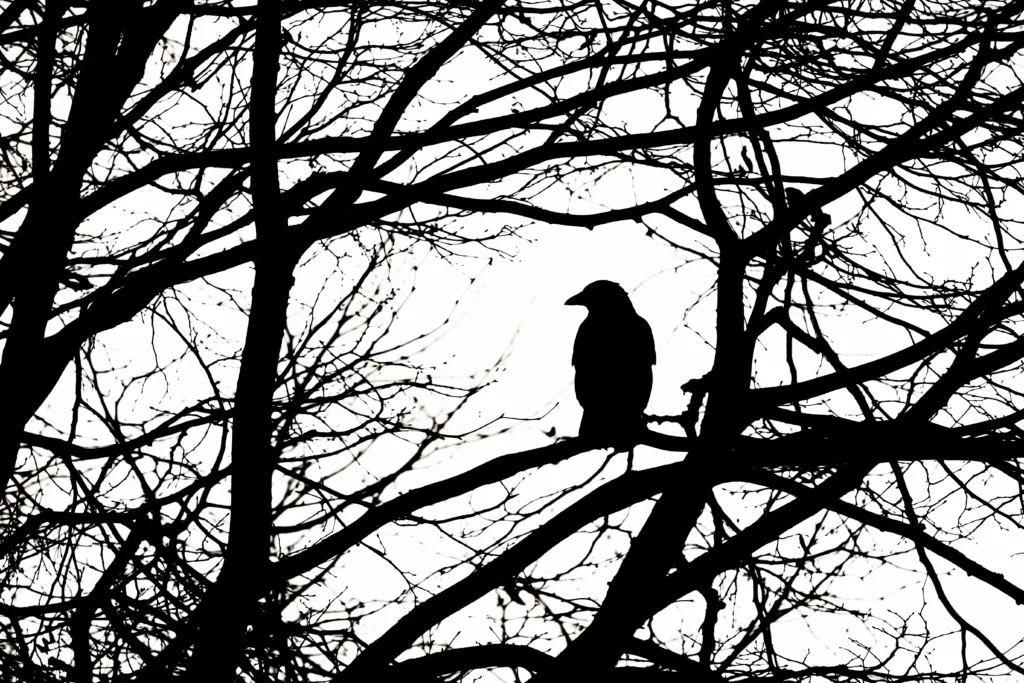Crows are fascinating birds known for thir intelligence and complex social behaviors. One question that often arises is whether crows mate for life or not. The answer is yes, crows are socially monogamous and do mate for life.
When crows reach adulthood, they choose a life-mate and stick with them throughout the winter and summer seasons. If one crow dies, another will take their place as a partner. However, it’s important to note that while crows are socially monogamous, they are genetically promiscuous. This means that while mated pairs typically stay together for life, extra pair copulations are not unusual in some populations.
During nesting season, many crows live in family groups, with mated pairs sharing territories with their grown children. The older offspring often help their parents with raising each season’s new brood of young birds. This cooperative breeding behavior is thought to increase survival rates for the entire family group.
Crows are also known for their remarkable intelligence. They have been observed making tools to dig food out of tight spots and can remember human faces associated with stressful situations for up to five years. In fact, crows have been found to have a remarkable ability to solve problems and use tools, placing them among the most intelligent birds on the planet.
Overall, crows are fascinating birds with complex social behaviors and remarkable intelligence. While they mate for life, they also exhibit genetic promiscuity and live in cooperative family groups during nesting season. These birds are truly a wonder of nature and continue to captivate scientists and bird enthusiasts alike.
Do Crows Maintain Long-Term Relationships?
Crows are known to be socially monogamous, which means that mated pairs will typically stay together for life. However, it is important to note that they are genetically promiscuous, which means that extra pair copulations are not uncommon, at least in some populations. This behavior is not unique to crows and is actually quite common in many bird species. Therefore, while crows may form long-term partnerships, it is not uncommon for them to engage in sexual behavior outside of their primary relationship.

Do Crows Form Family Units?
Yes, crows do stay together as a family, especially during nesting season. Mated pairs of crows share territories with their grown children, who in turn help their parents with raising each season’s new brood of young birds. This means that many crows live in family groups and work together to ensure the survival of their offspring. This cooperative behavior is common among crows and helps them to thrive in their environment. So, to answer your question, yes, crows do stay together as a family and work together to raise their young.
The Impact of Losing a Mate on a Crow
When a crow loses its mate, it can be a difficult time for the bird. Crows mate for life, so losing a partner can be a significant event. The surviving crow may mourn the loss of its mate, and it may exhibit behaviors such as calling out for its mate or searching for it. However, crows are social birds, and they often form close bonds with other crows in teir family groups or flock. If the surviving crow is part of a group, it may bond with another crow and form a new pair bond. In some cases, the surviving crow may remain alone for a time, but eventually, it will likely seek out a new mate. Overall, while losing a mate can be challenging for a crow, they are adaptable birds and can form new bonds with other crows.
Do Crows Have the Ability to Remember People?
Yes, crows have an impressive ability to remember human faces for years and can even associate them with specific events or situations. Research has shown that crows can recognize a person who has previously posed a threat to them and react negatively towards them. Additionally, they have been observed warning other crows about the presence of a dangerous human, suggesting they may communicate this information to their peers. Therefore, it is safe to say that crows have a remarkable memory and can remember humans for a long time.
Can Humans Form Friendships with Crows?
Yes, a human can befriend a crow. Crows are highly intelligent and social birds that have been known to form strong bonds with humans who treat them kindly and consistently. To befriend a crow, it’s important to approach them slowly and calmly, offering them food like nuts, seeds, or bits of fruit. Crows are also attracted to shiny objects and may appreciate small gifts like trinkets or coins. It’s important to remember that crows are wild animals and shold be treated with respect and caution. Building a friendship with a crow can take time and patience, but it can be a rewarding and fascinating experience for both the human and the bird.

Showing Affection in Crows
Crows, like many other animals, show affection in various ways. One of the most common ways crows express affection is through grooming or preening. They stretch out their necks and invite their mate or friend to groom their feathers. During the grooming process, the preener twirls individual feathers in its beak, often starting at the back of the head and working around to the front.
Another way crows show affection is by sharing food. Crows are known to bring food to their mates or kin as a sign of affection. They often share food with their young ones as well, which shows their love and care for their offspring.
Crows also engage in playful activities with their mates, such as flying together, chasing each other, and playing with objects. These playful activities strengthen the bond between them and show their affection.
Furthermore, crows are highly social animals and often form strong bonds with their family members and mates. They communicate with each other through a variety of vocalizations, including coos, caws, and clicks. Crows also engage in mutual preening and huddling, which helps to maintain their social bonds and shows their affection for one another.
In conclusion, crows show affection through different behaviors such as grooming, sharing food, engaging in playful activities, and maintaining social bonds. These behaviors help to build and maintain strong relationships between crows, and demonstrate the depth of their emotional lives.
Do Crows Sleep in the Same Place Each Night?
Yes, crows are known to return to the same roost evey night to sleep. This behavior is believed to be a way for them to stay safe and protect themselves from predators. They often gather in large groups, sometimes numbering in the thousands, to roost together. This communal roosting behavior is also believed to help them stay warm during cold nights. However, each morning, the roost breaks up into smaller flocks that disperse across the landscape to feed. In mid-afternoon, these smaller flocks start back toward the communal roost. So while they may not sleep in the exact same spot every night, they do return to the same communal roosting area.
The Intelligence of Crows
Crows are highly intelligent birds known for their exceptional problem-solving abilities and cognitive skills. They are capable of usig tools, recognizing faces of humans and other animals, and even understanding basic physics principles. Some research suggests that crows may possess cognitive abilities that rival those of apes, which are considered to be among the most intelligent animals. Crows are also known for their social complexity, living in tight-knit groups of related and unrelated individuals, and communicating with each other through a range of vocalizations and physical gestures. Overall, crows are considered to be highly intelligent birds with advanced cognitive abilities and complex social behaviors.
The Absence of Baby Crows
Crows are known for being quite secretive about their nests and offspring, making it difficult to spot baby crows. Typically, their nests are carefully constructed and hidden high up in the tree canopy, making them almost impossible to see from the ground. Additionally, crow nestlings grow very quickly, reaching almost 80% of their adult weight by the time they leave the nest. This means that the period during which they are small and vulnerable is relatively short, making it less likely that you will see them during this stage of their development. So, whle it may be challenging to spot baby crows, rest assured that they are out there, growing and thriving under the watchful eye of their attentive parents.

Do Crows Have Long-Term Memory of Those Who Hurt Them?
Yes, newly published research shows that crows have the ability to remember the faces of humans who have threatened or harmed them. It is believed that these memories can last for the bird’s lifetime. The research has shown that crows not only scold dangerous people, but they also include family members and even strangers into their mob. This suggests that crows have the ability to recognize individual humans and can distinguish between those who pose a threat and those who do not. Overall, the research suggests that crows have a remarkable ability to remember and recognize faces, whch may help them to avoid potential threats in the future.
Can We Be Forgiven by Crows?
Crows, members of the corvid family, are known for their high level of intelligence and complex social behavior. Recent research has shown that these birds are capable of recognizing individual humans and holding grudges against those who have mistreated them in the past. However, crows have also been observed engaging in reconciliation behaviors with fellow flockmates after a fight, suggesting that they are capable of forgiveness in certain social contexts. Additionally, crows are more likely to seek forgiveness and reconcile with individuals with whom they have a close relationship rther than with passing acquaintances. Overall, while crows may not forgive humans for mistreatment, they are capable of forgiveness within their own social groups.
Do Crows Have the Ability to Remember Who Feeds Them?
Yes, crows have the ability to remember individuals who have fed them in the past. Studies have shown that crows are capable of recognizing and remembering human faces, and they can associate certain individuals with positive experiences, such as receiving food. This means that if you regularly feed crows in your area, they are likely to remember you and may even form a bond with you over time. However, it is important to note that crows can become quite demanding when it comes to food, and they may not understand when you stop providing it. So, while it can be rewarding to build a relationship with thee intelligent birds, it is also important to be mindful of the potential consequences of feeding them regularly.
The Possibility of a Crow Bringing Gifts
Yes, it is possible for a crow to bring you gifts. However, it is important to note that this behavior is typically observed in crows that have developed a positive relationship with humans, usually those who regularly feed them. These gifts may include objects such as keys, lost earrings, bones, or rocks. This behavior is known as “gifting” and is believed to be a way for the crows to show their appreciation for the food and care they receive from humans. It is important to remember that crows are wild animals and should be treated with respect and caution.
Crow Perception of Humans
Crows see humans as potential threats or sources of food. They have keen eyesight and can recognize and remember human faces, even from a distance. Crows are known to have a remarkable ability to remember human faces and can distinguish betwen individuals based on their facial features and clothing. This means that a crow can identify and remember a person who has shown kindness or hostility towards them in the past. Additionally, crows are known to understand human behavior and can interpret our body language and gestures to determine our intentions. Overall, crows perceive humans as intelligent beings and are able to adapt their behavior accordingly.
Do Crows Possess Emotions?
Recent studies have suggested that crows do indeed have the ability to experience emotions. For example, experiments have shown that crows can recognize and respond to the emotional state of other crows, indicating that they have the capacity to empathize. Additionally, crows have been observed engaging in behaviors that suggest they may be capable of experiencing emotions such as fear, joy, and anger. They have been observed mourning their dead, playing games, and engaging in acts of altruism. While we cannot know for certan what emotions crows experience, the evidence suggests that they are capable of experiencing a range of emotions similar to those experienced by humans and other animals.

Conclusion
In conclusion, crows are fascinating creatures that exhibit remarkable intelligence and social behaviors. As socially monogamous birds, they typically mate for life, but can engage in extra pair copulations. They live in family groups, with older offspring helping their parents raise new broods. Crows are also known for their impressive memory, being able to remember human faces associated with stressful situations for up to five years. Furthermore, they have been observed making tools to obtain food. Overall, crows are not just ordinary birds, but rather complex and intriguing animals that continue to fascinate researchers and bird enthusiasts alike.
